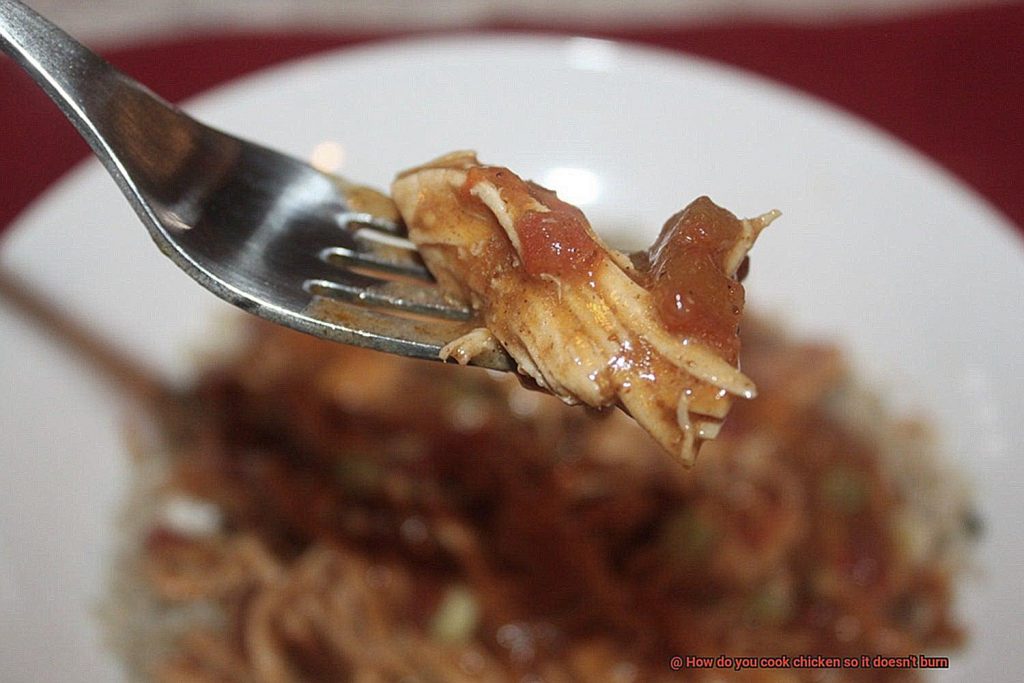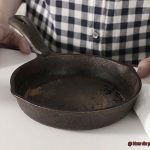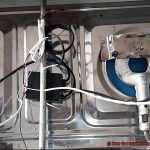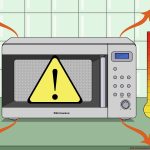Cooking chicken is an art form – a delicate balance between heat and time that can make or break your meal. But nothing ruins a dish quite like burnt, dry chicken. Not only does it taste terrible, but overcooked chicken can also be harmful to your health. So, how do you cook chicken so it doesn’t burn?
Don’t worry, we’ve got you covered. In this article, we’ll share expert tips and tricks to help you achieve perfectly cooked chicken every time. From prepping your bird to cooking it at the right temperature, we’ll cover everything you need to know to create a juicy and tender masterpiece.
First things first: let’s talk about the importance of letting your chicken sit out of the fridge before cooking. This step helps the meat cook evenly and prevents it from drying out. We’ll also explore the benefits of marinating chicken before cooking and using oils or butter to create a natural non-stick coating that will help prevent burning.
Of course, different cuts of chicken require different cooking methods. We’ll discuss ideal temperatures for roasting versus grilling and provide tips for achieving succulent results with each method.
So whether you’re hosting a dinner party or just want to impress your family with perfectly cooked poultry, keep reading for our expert advice.
Contents
Preparing the Grill or Cooking Surface
Grilling chicken is a delicious and healthy option, but getting it right requires proper preparation of the grill or cooking surface. Here are some essential steps to make sure your chicken doesn’t burn and comes out perfectly cooked every time.
Firstly, ensure that the grill grates are clean and free of debris. Using a wire brush, scrub the grates thoroughly to remove any leftover food from previous grilling sessions. This will prevent sticking and burning of the chicken.
Next, oiling the grill grates is crucial to prevent the chicken from sticking and achieve those perfect grill marks. Choose a high smoke point oil like canola or vegetable oil and with a paper towel, lightly coat the grates.
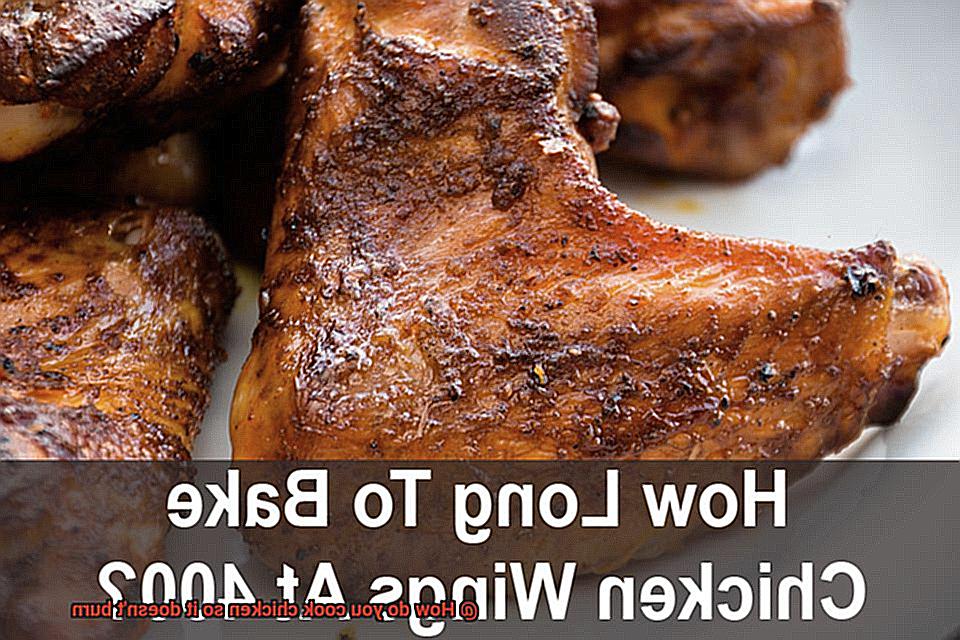
Properly preheating the grill is essential to ensure even cooking and prevent hot spots that can cause burning. Preheat the grill on high heat for at least 10-15 minutes before placing the chicken on it.
For thicker cuts of chicken, consider indirect grilling by placing the chicken on one side of the grill while leaving the other side empty. This allows for slower cooking without burning while still achieving that delicious smoky flavor.
Marinating your chicken before cooking can also help prevent burning. A marinade not only adds flavor but also helps keep the chicken moist and tender. Let the chicken marinate for at least 30 minutes before cooking to allow the flavors to penetrate.
Lastly, monitor the internal temperature of the chicken using a meat thermometer. The chicken should reach an internal temperature of 165°F before removing it from the grill to ensure it’s fully cooked without burning.
Controlling the Heat
Cooking chicken to perfection requires a delicate balance of heat control. Burning it can ruin the taste and texture, but not cooking it thoroughly can be dangerous. Luckily, with expert tips and tricks, getting the perfect chicken dish is not out of reach.
Firstly, preheating your grill or oven is essential. By doing this, you ensure that your cooking surface is hot enough to give your chicken that mouth-watering sear and crust while keeping it juicy on the inside. Preheating also speeds up the cooking process, reducing the chances of burning.
Another crucial factor in controlling heat is using indirect heat when grilling or baking chicken. This means that you don’t place the chicken directly over the heat source but cook it on a cooler part of the grill or oven. This method allows for slower and more even cooking and reduces the chances of burning while creating a perfectly cooked chicken.
It’s also vital to pay attention to different cuts of chicken and their cooking times and temperatures. Boneless, skinless chicken breasts cook faster than bone-in chicken thighs. Using a meat thermometer to check the internal temperature of the chicken is vital to ensure thorough cooking without overcooking.
In summary, controlling heat is the key to achieving tender, juicy, and deliciously cooked chicken. Here’s a quick rundown of expert tips for controlling heat when cooking chicken:
- Preheat your grill or oven to maintain a hot cooking surface
- Use indirect heat to slow down and evenly cook your chicken
- Pay attention to different cuts of chicken and their respective cooking times and temperatures
- Use a meat thermometer to check if your chicken is thoroughly cooked without being overcooked
Marinating Your Chicken
Look no further than marinating. Marinating your chicken is a crucial step in ensuring it cooks evenly and doesn’t burn. Not only does marinating add mouthwatering flavor, but it also helps to tenderize and moisten the meat.
But how do you marinate chicken properly? Here are some essential steps to follow:
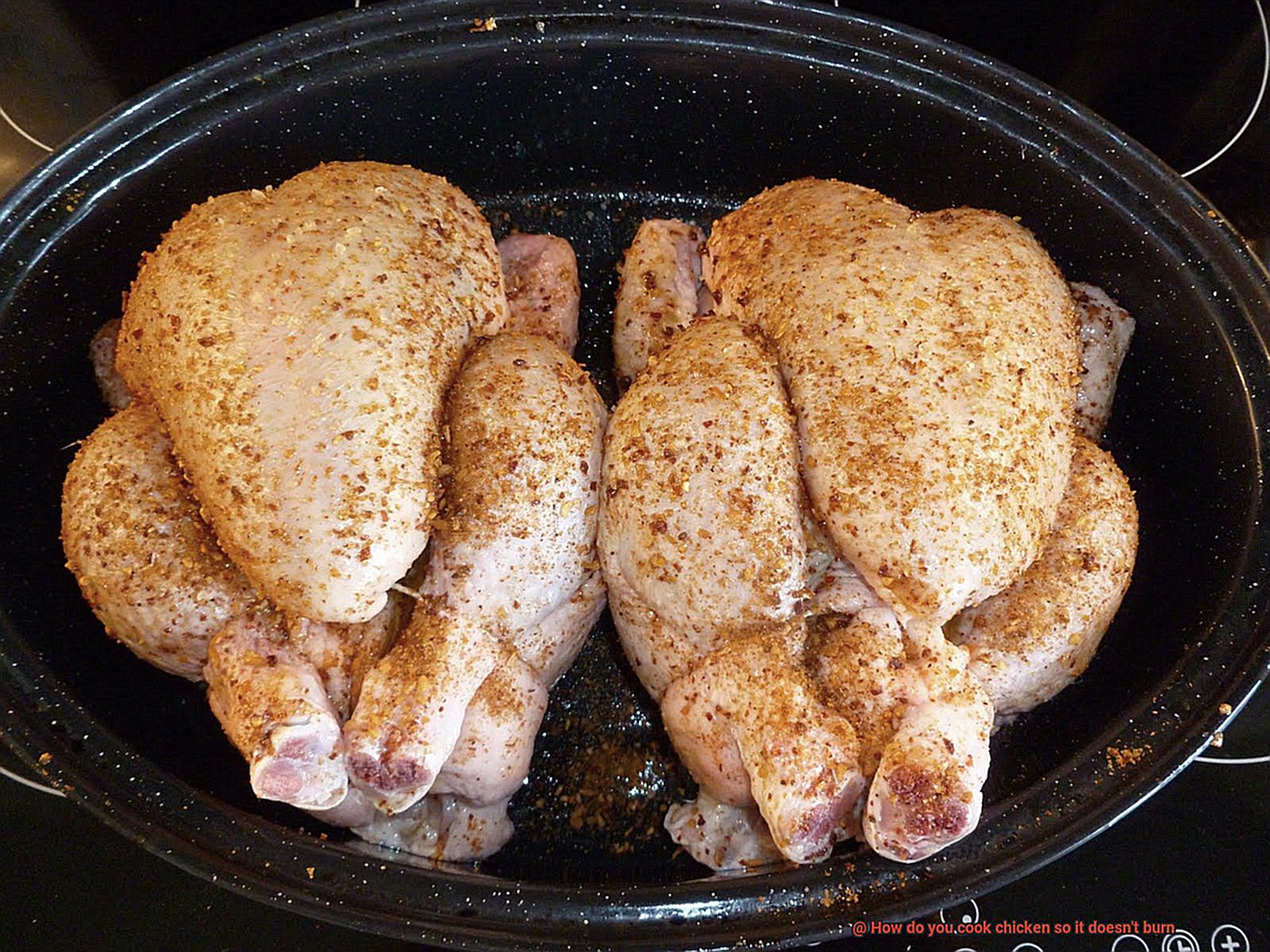
Use an acidic ingredient: Lemon juice, vinegar, or yogurt are all excellent options to help break down the fibers in the meat and infuse it with flavor.
Give it enough time: For optimal results, marinate your chicken for at least 30 minutes up to overnight in the refrigerator. This allows the flavors to fully penetrate the meat, resulting in a more delicious and tender final product.
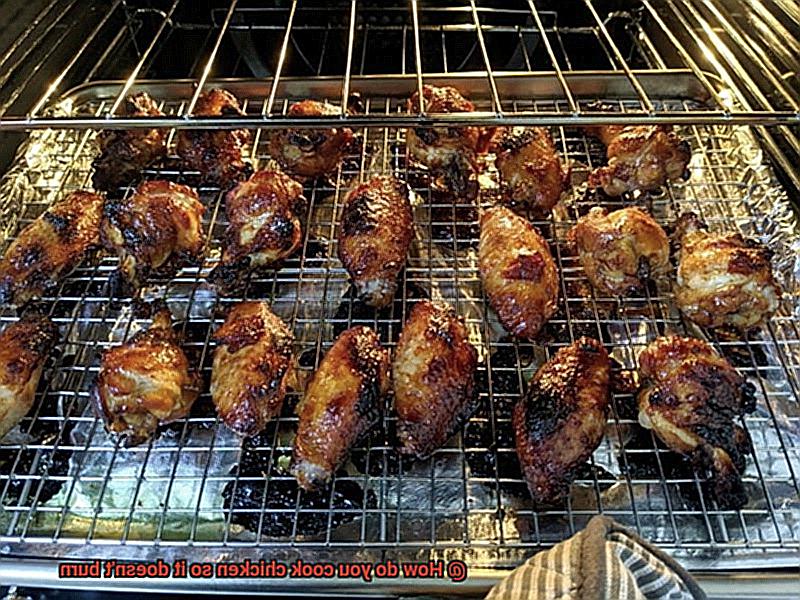
Seal it up: Be sure to seal your chicken in an airtight container or plastic bag during marination to avoid cross-contamination with any other raw meats in your fridge.
Pat it dry: Before cooking, make sure to pat your chicken dry with paper towels. Wet chicken can cause flare-ups on the grill or in the oven, leading to uneven cooking and burnt spots.
Remove excess marinade: When cooking marinated chicken, be sure to remove any excess marinade before placing it on the grill or in the oven. Excess marinade can drip onto the heat source and cause flare-ups.
Monitoring Internal Temperature
Cooking the perfect chicken can be a challenge, but it all boils down to monitoring its internal temperature. Not only does this ensure that the chicken is safe to consume, but it also helps you avoid the dreaded dry and rubbery meat that comes from overcooking.
The best tool for monitoring internal temperature is a meat thermometer. It’s simple to use: insert it into the thickest part of the chicken without touching the bone and check multiple spots to ensure even cooking. But that’s not all – adjusting the heat of your grill or oven based on the internal temperature reading is also crucial. If your chicken is cooking too quickly, lower the heat or move it to a cooler part of the grill or oven. If it’s taking too long, increase the heat or move it closer to the heat source.
Once your chicken has reached its desired internal temperature of 165°F, don’t rush to serve it up just yet. Letting it rest for a few minutes allows the juices to redistribute throughout the meat, resulting in a juicy and flavorful dish.
Avoiding Cross-Contamination
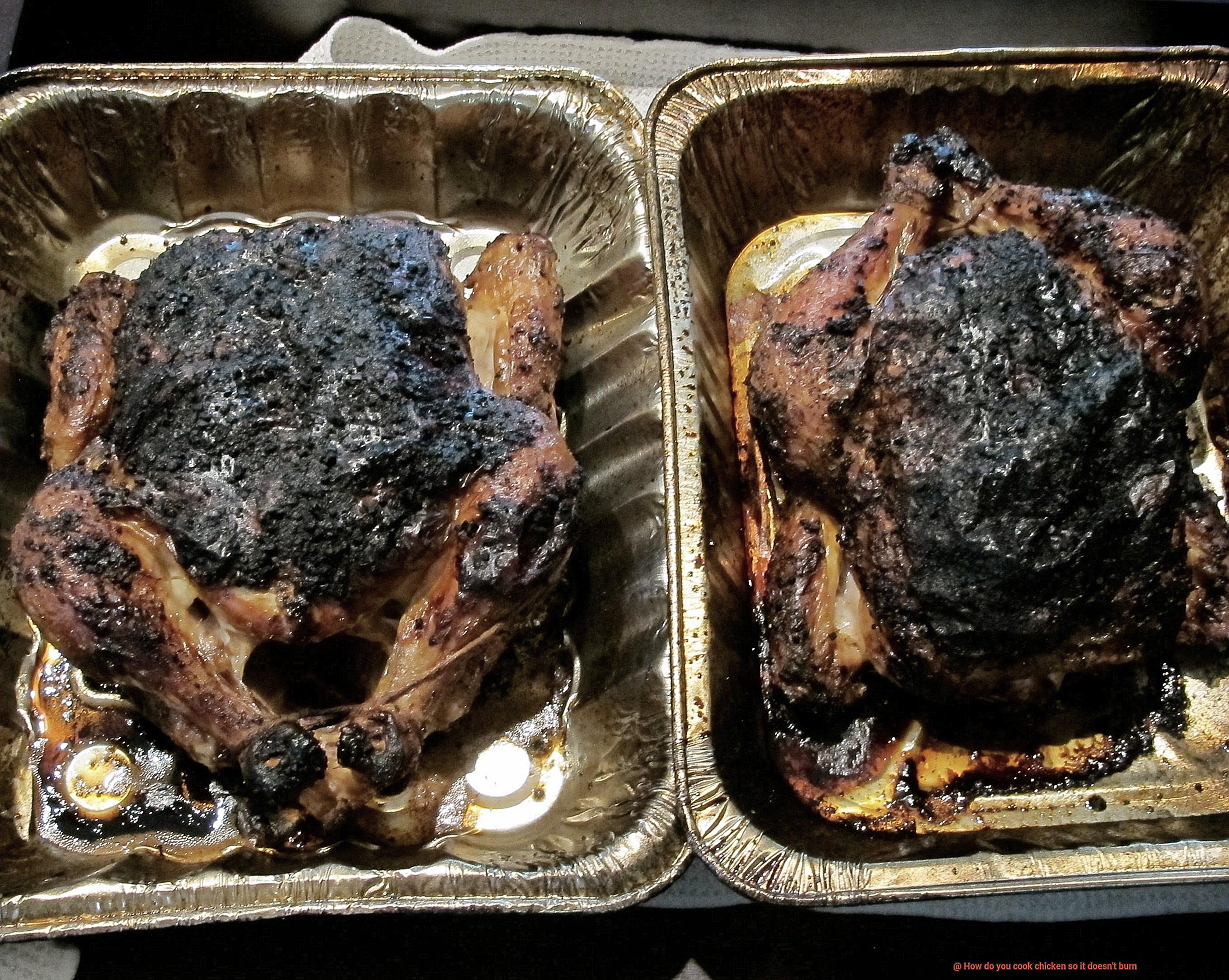
When it comes to cooking chicken, cross-contamination is something that should always be on your mind. The transfer of harmful bacteria from raw chicken to other foods or surfaces can lead to foodborne illnesses and serious health problems. But fear not, by following some simple steps, you can ensure that your chicken is cooked safely and deliciously without any risk of cross-contamination.
First and foremost, always start by washing your hands with soap and water before handling chicken. This may seem like a no-brainer but is often overlooked. By doing so, you can prevent the spread of harmful bacteria from your hands to the chicken or other foods. Additionally, make sure to use separate cutting boards, utensils, and dishes for raw chicken and other foods. This will prevent cross-contamination and keep everyone safe.
Proper storage is also a crucial part of avoiding cross-contamination. Make sure to store raw chicken in a sealed container or bag in the refrigerator or freezer. This will prevent any juices from leaking onto other foods in the fridge and reduce the chances of cross-contamination.
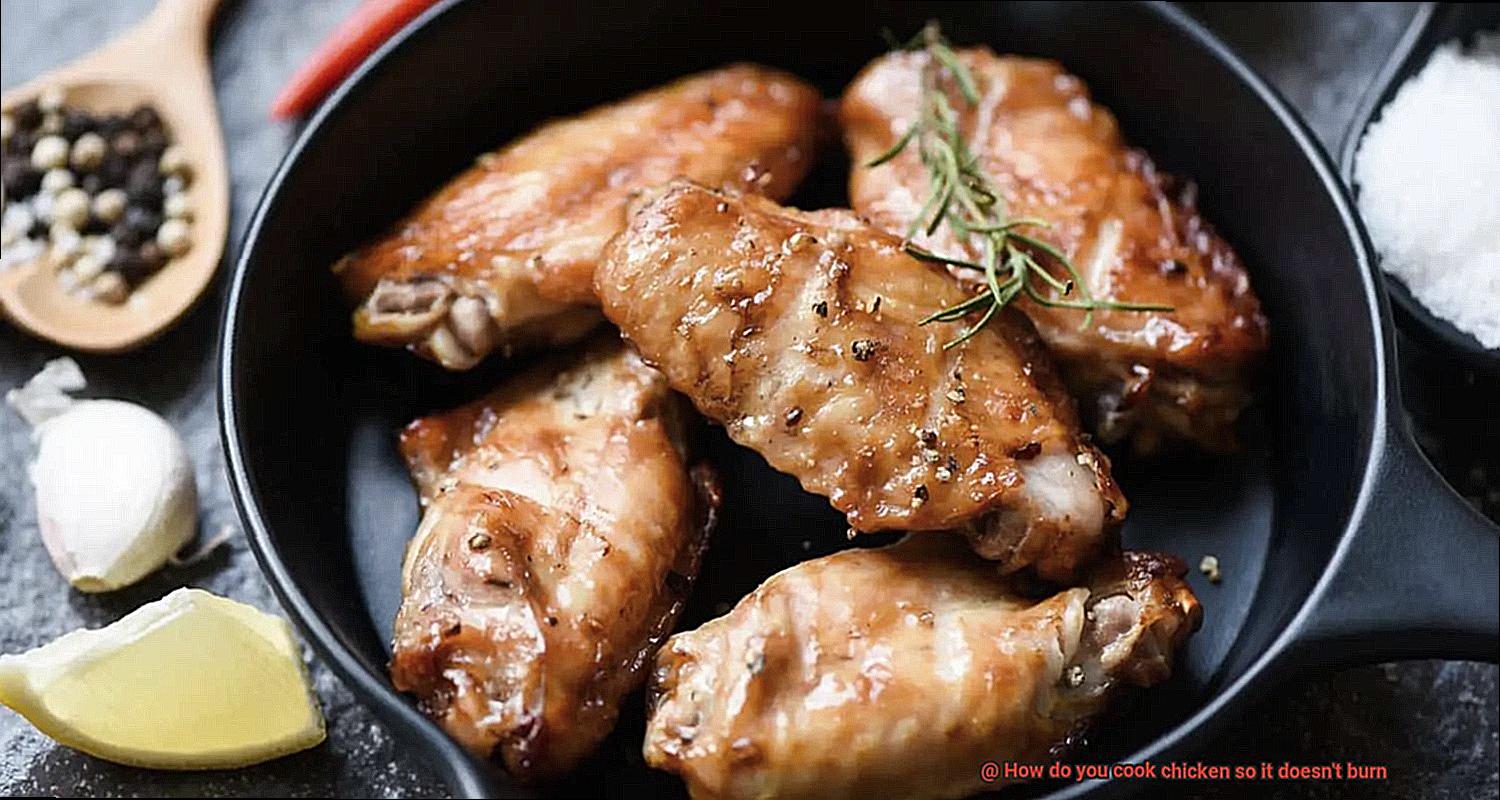
When marinating chicken, make sure to do so in the refrigerator and not on the counter. Any leftover marinade should be discarded immediately as it may contain harmful bacteria that could cause illness.
Lastly, cooking chicken to an internal temperature of at least 165°F (74°C) using a meat thermometer is essential in eliminating any harmful bacteria. Avoid cutting into the chicken before it’s fully cooked as this can lead to cross-contamination.
In summary, here are the key steps to take for avoiding cross-contamination when cooking chicken:
- Wash your hands thoroughly before handling chicken
- Use separate cutting boards, utensils, and dishes for raw chicken and other foods
- Store raw chicken in a sealed container or bag in the refrigerator or freezer
- Marinate chicken in the refrigerator and discard any leftover marinade
- Cook chicken to an internal temperature of at least 165°F (74°C) using a meat thermometer
Basting to Keep Moisture
Basting is a tried-and-true technique that involves brushing or spooning melted butter, oil, or marinade over the chicken while it cooks. This not only adds delicious flavor but also helps to maintain moisture in the meat. Let’s explore some expert tips for basting your chicken like a pro:
- Timing is Key – If you’re grilling your chicken, basting should be done towards the end of the cooking time. This prevents the marinade’s sugar from burning and sticking to the grill grates, causing your chicken to dry out.
- Tools of the Trade – When basting your chicken, use a silicone brush or spoon to apply the liquid. This ensures that you don’t lose any of those succulent juices from the chicken.
- Even and Frequent Basting – Make sure to baste both sides of the chicken evenly and frequently, about every 5-10 minutes. This technique helps to keep the chicken moist and flavorful throughout the cooking process.
- Add Some Steam – Take your basting game up a notch by adding a small amount of water or broth to the basting liquid. The steam created will help to keep your chicken moist and juicy.
Knowing When to Flip the Chicken
Firstly, preheat your grill or pan to the right temperature before adding the chicken. This will prevent sticking and burning. A good rule of thumb is to let it warm up on medium-high heat for 10-15 minutes.
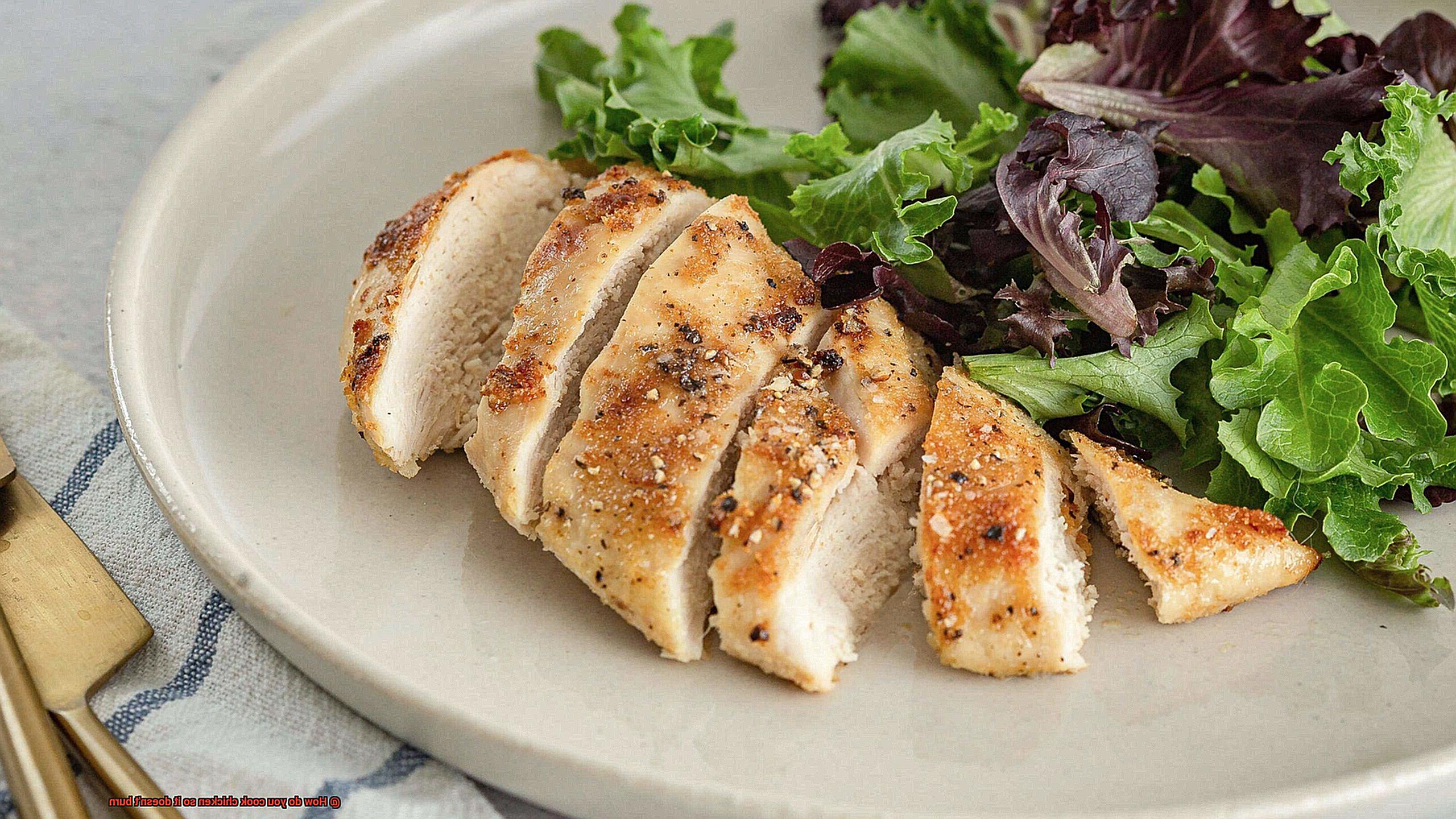
Next, timing is crucial. The thickness of your chicken will determine how often it needs to be flipped. Thicker cuts require less flipping, while thinner pieces can be flipped more often without overcooking.
When grilling, oil the grates before adding the chicken. This will make flipping easier and prevent sticking. And when flipping, use tongs instead of a fork to avoid piercing the meat and releasing its juices.
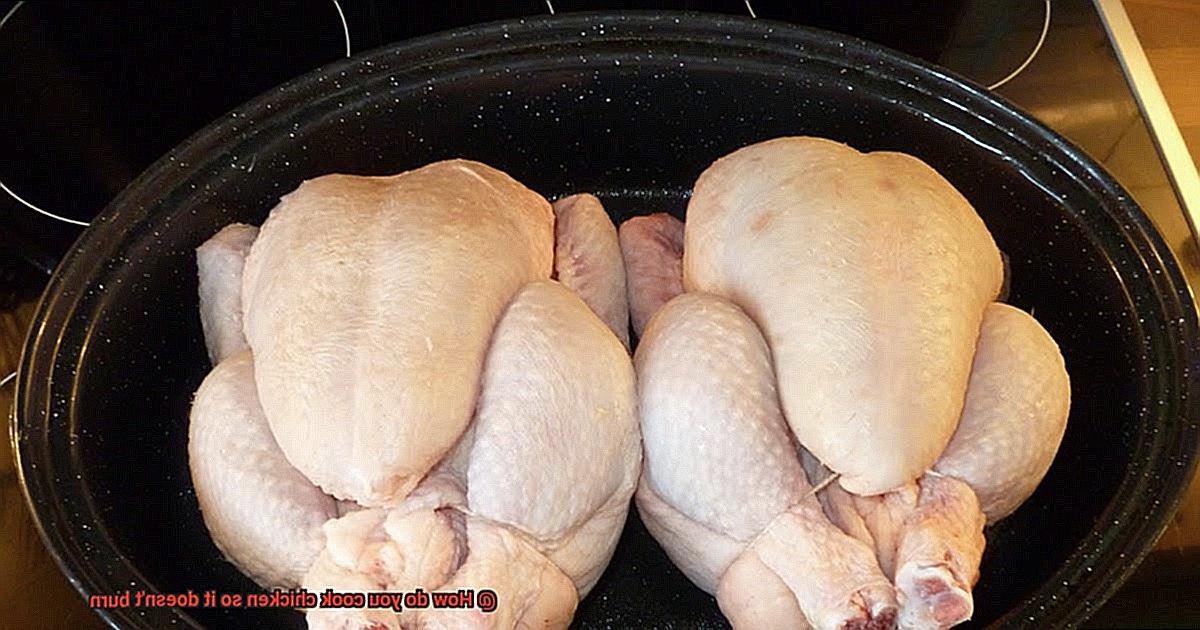
Lastly, keep an eye on the color and texture of the chicken as it cooks. Once one side has developed a beautiful golden brown color, it’s time to flip it over. And when done, your chicken should feel firm and springy to the touch.
But wait, there’s more. Here are some additional tips to ensure your chicken is cooked to perfection every time:
- Don’t overcrowd the pan or grill. Leave space between each piece of chicken so they cook evenly.
- Use a meat thermometer to check if your chicken is cooked all the way through.
- Let your chicken rest for a few minutes before cutting into it. This allows the juices to distribute evenly throughout the meat.
6QBqFLHuYrQ” >
Conclusion
To cook chicken to perfection, you need to balance heat, time, and technique. Burnt or dry chicken is not only unappetizing but also poses health risks. But don’t fret. With expert tips and tricks, you can achieve perfectly cooked chicken every time.
Proper preparation of the grill or cooking surface is crucial for grilling chicken without burning it. Ensure that you oil the grill grates with a high smoke point oil like canola or vegetable oil and preheat the grill on high heat. Marinating your chicken before cooking can also help prevent burning and keep it moist and tender.
Controlled heat is key to achieving tender and deliciously cooked chicken. Preheating your grill or oven, using indirect heat when grilling or baking chicken, paying attention to different cuts of chicken’s respective cooking times and temperatures, and using a meat thermometer are all crucial factors in controlling heat.
When handling raw chicken, avoiding cross-contamination is vital. Wash your hands thoroughly before handling chicken, use separate cutting boards, utensils, and dishes for raw chicken and other foods, store raw chicken correctly in the refrigerator or freezer.
Basting with melted butter, oil or marinade while cooking helps maintain moisture in the meat. Knowing when to flip the chicken by preheating the grill or pan to the right temperature before adding the chicken is also crucial.

